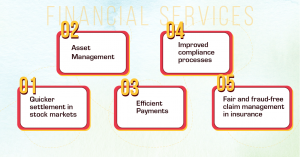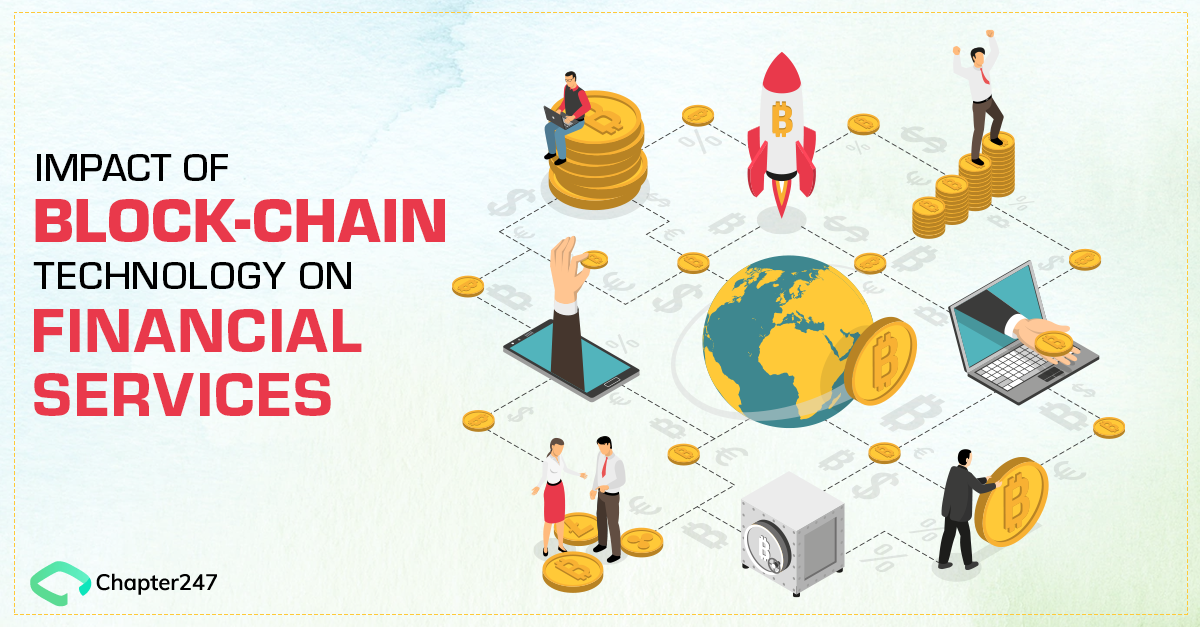One of the largest booming sectors in the industry is finance. This sector witnesses millions of transactions worth trillions of dollars every single day. The transactions require high security, transparency, and cost-efficiency as their high priority. However, do you know that almost 45% of the financial intermediaries such as payment networks, stock exchanges and various money transfer services are targeted under cybercrime every year? Yes. To combat this issue, we see various businesses moving towards Blockchain technology adoption into their day-to-day financial operations.
This blog post, we talk about the intrinsic strengths of blockchain to tackle data securely, creating transparency and generating cost-efficient flow of transactions throughout. Read on!
When it comes to the transformation of financial services, blockchain technology has been one of the biggest accelerators in creating security for various services like stock market, banking, asset management, and insurance. Blockchain creates a ledger of all transactions on the internet, which is secure, tamper-proof, and easily accessible by the verified parties.
Similar to the internet, blockchain carries no central authority, instead, it is a shared record of transactions circulated across a network of users. The technology is made of a series of data blocks which records the patch of transactions. These blocks are then digitally chained together and sealed with an advanced cryptography.

Quicker settlement in stock markets
Stock markets are highly volatile in nature and require a strong security support for a seamless transaction flow. To keep the security check, various major stock exchanges are exploring the potential of blockchain technology in their operational processes. Key idea is to allow almost immediate stock settlements by reducing the transaction time as well as the operational cost. This technology also automates compliance through smart contracts with a higher level of security and transparency.
To give an example, NASDAQ uses blockchain technology to issue and share private securities. Another example is of London Stock Exchange which is exploring blockchain opportunities with cross-industry groups of institutions in order to change the way securities are being traded in Europe.
Asset Management
The global commerce and trade sector is growing exponentially every day. With this, the asset management domain has entered the fastest-growing ones & is expected to grow by USD 150 trillion by 2025. In today’s time, both the asset management sector and supply chain or procurement network majorly focus on a centralized digital system that provides a real-time visibility of assets within the systems. The current centralized data management processes are creating a network of distributed ledger systems. With the help of blockchain technology we can leverage the complex and time-consuming processes.
This distributed ledger concept facilitates direct trading and settlements across geographical boundaries. Thereby helping in reducing cost, increasing the accuracy of data, and reducing any delay in the processes. It makes the system cautious towards any trading errors, cyber fraud or misinterpretation during the exchange of assets between multiple parties.
Efficient Payments
Blockchain technology is known to improve payment transparency, efficiency, trust, and security. It is also known to reduce the cost for financial service firms and their users. Initially, payments from one bank to another could take up to a week to get processed, however, with the help of blockchain the amount can get transferred instantly. Additionally, with the use of digital currencies and the distributed ledger technology, one can now make payment faster, cheaper, and in a more convenient manner. To add more, Central banks also have started experimenting if the revamped payments could incorporate distributed ledger.
Blockchain thus saves a high amount of time, money, and resources for all the parties involved. It has also reduced the requirement of middle office and back-office staff, as payments now get settled instantly. With help of a synchronised blockchain process and optimised operations, the distributed ledger can become the best way to enable faster and cheaper payments.
Improved compliance processes
KYC or know your customer is an essential requirement for all the financial institutions across the world. The financial institutions are majorly responsible for complying and reporting on various requirements from the local regulators. This process can be highly time taking, labour-dependent and open to errors. Blockchain services such as KYC-chain can help the financial firms to streamline their KYC process and align information accordingly.
Blockchain technology provides the service of KYC updates to the banks in a real-time and highly efficient manner by reducing the duplication of data, lowering workload, and increasing trust in the source. The technology automates customer identification through means of a single digital source ID and multiple other information that allows a seamless exchange of digital documents between banks and other related sources. It thus results in automation of account opening, reduction of cost whilst maintaining the privacy of data, which is the first priority from a legal perspective.
Fair and fraud-free claim management in insurance
Blockchain technology is empowering the insurance industry by automating the process of claim sorting and processing further through its secure feature of smart contracts. There are multiple steps when it comes to any sort of clin settlement, such as cross-industry data accessing, simple approach to customer’s transactional history and a centralized pool of customer authentication which is enhancing the claim settlement process and making it fraud-free.
In a manual claim settlement, a long communication takes place between multiple parties such as client, broker, insurer, and bank, making it a long, tedious, and costly process. Additionally, these communications involve cross-checking of information, reconfirmation, and other duplicity of tasks. However, with Blockchain these parties are linked to each other via a shared and secured network and collaborated in a manner which reduces inefficiency and streamlines the entire end to end process. Hence, it helps businesses to work together more efficiently and effectively.
How can Chapter247 help you implement Blockchain in your day-to-day business?
Wondering with the growth of the financial service industry and its adoption towards Blockchain, how to implement this innovation in your day-to-day business? Well, you are just a click away! Connect with Chapter247 and get the best customized plan for integration of blockchain in your business. Become part of the blockchain network league and develop highly cost-efficient and safe transactions. Get in touch now!








